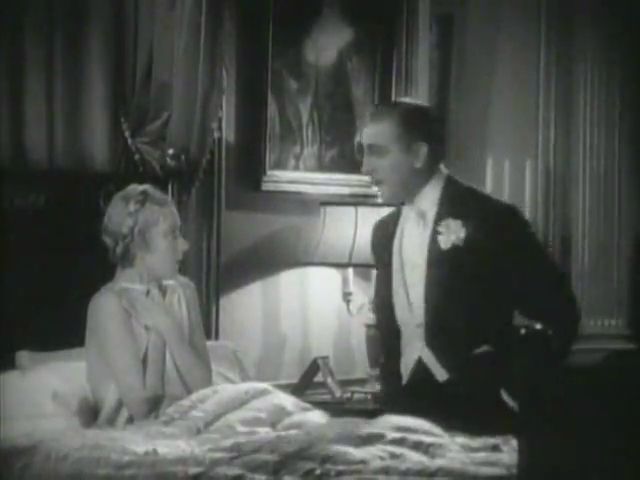Arsène Lupin

The impoverished
duke, the countess with a broken gown strap, the retiring inspector, a certain
Leonardo (vd.
Becker). Conway shows his credentials in the opening sequence, the rest follow
suit, as it were.
An assured basis
of The Pink Panther (dir. Blake
Edwards) and To Catch a Thief (dir.
Alfred Hitchcock). Ahead of Notorious,
the bottle of champagne in bed. Retribution for a notable villain and fraud, cf. Franju’s Judex.
“You mean
they stole your police, too?” The great unmasking, ahead of
Huston’s The List of Adrian
Messenger. Ahead of Dieterle’s Fashions
of 1934, the satisfying end.
Andrew Sarris (The American Cinema), “few of his
films are worth mentioning even in passing.”
Mordaunt Hall of the New York Times, “film possesses a good deal of humor and some very neat ideas.” Variety, “a high artistic level.” Tom Milne (Time Out), “very dated and sluggishly directed.” Leonard Maltin, “ripe detective yarn set in Paris.” TV Guide, “a great deal of theorizing between the two about crime and criminals subordinates action”. Craig Butler (All Movie Guide), “a treat for fans of light mystery entertainment.” Halliwell’s Film Guide, “amusing crook comedy”.
Viva Villa!
The
“glamorous country” to the South is richly honored with a
masterpiece of masterpieces on the subject of a native son. Fernandez would be
impossible without it, Kazan, Aldrich, Lean, Peckinpah, Eastwood and countless
others have profited by it, down the ages it comes to us, unnoticed by the
critics, lovingly observed by the directors who analyzed its every nuance.
Ben Hecht is the
presiding genius, Hawks and even Wellman are reported to have taken a more or
less sizeable hand, Conway is quite capable of it.
The big dumb
genius rights wrongs from town to town, bows to Madero and joins an army of
liberation, assumes the presidency to set all in order and retires to be gunned
down at a butcher shop buying pork chops for his mistress.
A jury of dead
men pass judgement on a kangaroo court, Madero makes the mistake of exiling his
only friend.
Every lavish art
is set to work to honor the bandit Cincinnatus of the screenplay, comparisons
are foolish, every film that followed in its footsteps did no more.
The essence of
the revolution is an end to hat-doffing (cp. Donald Duck at the Museum of
Modern Marvels in Modern Inventions three years later).
The Girl from Missouri
A key film for
Nicholas Ray’s Party Girl.
“So this is
what you call artistic, huh?”
“Uh, ha! Have a cigar.”
“Never had
much time for this sort of thing myself.”
As at the start
of Huston’s In This Our Life,
financial ruin.
“Oh,
what’s that, it’s nice, what is it?”
“That’s
a genuine Cellini.”
“Oh,
thought it was a boat, heh heh,
might pick it up at auction sometime.”
The showgirl far
from the Show Me State.
She gets shown
plenty, “just as tough as you could make it.”
Russell’s Valentino has the tit-for-tat finesse
(“watch the birdie!”).
An entirely
obscure satire of the American delegate to the international disarmament
conference, except that Capra understood it and produced the obscure political
dilemma faced in State of the Union.
Favorably
reviewed by Photoplay and Variety (in Halliwell’s Film Guide, likewise).
A Tale of Two Cities
In Paris the people
have no wine, in London a witless barrister’s witty junior drowns himself
with the stuff.
Thereby hangs a
tale of the Revolution.
The film was
widely admired with some reservations probably stemming from the difficulty of
analysis (it gives you Sagal’s The Omega Man, for example),
therefore Dave Kehr could at length conclude in the Chicago Reader that
the direction was “strictly of the Classics Illustrated school.” In
the first place Kehr obviously never read a Classics Illustrated in his life,
in the second Andre Sennwald of the New York Times occasionally
recognized great direction when he saw it, and this was one such occasion.
Halliwell speaks
of a “richly detailed version of the classic melodrama, with production
values counting more than the acting,” which only means he couldn’t
follow the action.
Lewton and
Tourneur have the second unit, the film comes with a bibliography like
Pasolini’s Salò.
A Yank at Oxford
Pulling the other
one, brawny and not tame, is “the ritual”.
He has the dull
sister and the smart dame (the bookseller’s wife), and gets sent down for
it.
The truth,
however, the truth of the thing has him beat Cambridge.
If you only knew,
it saves a bright young man for the Foreign Office.
Honky Tonk
The city boss,
from his three-card trick just ahead of tar and feathers and deeply-notched
rail, to militia from his pal the governor to put down unruly citizens.
This is as stark a picture as could be drawn, and
there may be higher villains yet, Conway leaves that open.
T.S. of the New York Times noticed the charm
and swagger, if little else. Variety agreed, on the romance angle.
The Hucksters
The advertising
business as the seat of tyrants and despotism, looked at in every way
conceivable.
It was before
Wise’s Executive Suite examined
ledgers and production. The complex material is thoroughly expressive, every
shot and frame is structural.
A twenty-second
pan right across the busy pool of the Sunset Hills Hotel conveys a lifetime but
leads to a gag, not the honeymoon couple starting out in a locked bungalow but
two comedy writers and an executive constructing a new show, so the executive
can afford to marry.
The
ten-million-dollar account spits on the boardroom table for memorability,
that’s how he sells.
One of the
greatest works in all of the American cinema, even if Variety and the New York
Times failed to take notice.